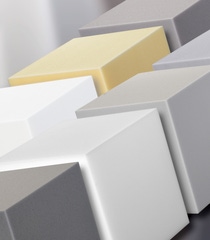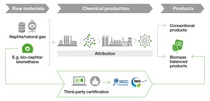- Rely on the same high quality with Basotect® EcoBalanced to which you are accustomed!
Performance Polymers
Basotect® EcoBalanced
Reduce your Product Carbon Footprint – it’s that easy!
Basotect® EcoBalanced is the melamine resin foam with the lowest PCF on the market – up to 50% compared to standard Basotect® grades.
As the world’s first melamine foam manufacturer, BASF introduces Basotect® EcoBalanced: It helps to reduce the Product Carbon Footprint (PCF) of many sound absorption applications in the transportation as well as in the building and construction industries. Basotect® EcoBalanced has an up to 50% lower PCF (1) than the respective BASF standard grades because of two sustainability levers:
- It is manufactured in a resource-efficient process using 100% green electricity.
- The fossil raw materials needed to produce it have been replaced with renewable feedstock at the very beginning of the production. The renewable feedstock comes from organic waste and residual biomass and is attributed to the Basotect® grade via a mass balance approach which is certified according to REDcert2 and ISCC PLUS (2).
Thus, Basotect® EcoBalanced not only contributes to reducing the use of fossil resources: BASF also offers its customers transparency by providing reliable PCF data to support them in evaluating their own products and achieving their sustainability targets.

BASF addresses your need for reduced Product Carbon Footprint (PCF)

Comparison with alternative materials (kg CO2 eq/m3)
Your sustainability advantages
- Basotect® EcoBalanced has an up to 50% lower Product Carbon Footprint (PCF) than the respective standard grades
- Basotect® EcoBalanced is manufactured in a resource-efficient process utilizing 100% green electricity
- For Basotect® EcoBalanced, fossil raw materials are replaced with renewable feedstock from biowaste at the very beginning of the value chain and attributed via a mass balance approach
- Greater transparency: We provide you with reliable PCF data to support you evaluate your own products and achieve your sustainability targets
Easy drop-in solution
• Same material performance as respective standard grades
• No need for adapting the existing manufacturing process or for extra investment into new processing lines
• No need to re-qualify most of your applications made of Basotect® EcoBalanced
Applications that benefit from Basotect® EcoBalanced
-
Building and Construction: wall and ceiling sound absorbers, HVAC applications, air cleaners
-
Transportation: sound absorption components
Applications that benefit from Basotect® EcoBalanced
-
Building and Construction: wall and ceiling sound absorbers, HVAC applications, air cleaners
-
Transportation: sound absorption components
Basotect® EcoBalanced: meet the first high-quality, durable and low-PCF melamine resin foam made in Germany by BASF, the technology and global market leader for melamine resin foam!
How do we achieve the low PCF of Basotect® EcoBalanced?
BASF is the first company with transparent emission data for their melamine resin foam. This helps customers to better measure and reduce the CO2 footprint of their products in transportation as well as in building and construction – industries that play a crucial role in reducing global emissions.
• BASF has developed a digital application to calculate the cradle-to-gate PCFs for its 45,000 sales products, including Basotect®.
• The PCF comprises all product-related greenhouse gas emissions that occur until the BASF product leaves the factory gate: from the purchased raw material to the use of energy in production processes.
Biomass Balance: A practical approach to reduce the dependency on fossil feedstock

Reduce the PCF of your products and increase the use of renewable feedstock with Basotect® EcoBalanced!
(1) BASF’s product carbon footprint (PCF) calculations for conventional products follow the requirements and guidance given by ISO 14067:2018. A TÜV Rheinland methodology review has certified that the SCOTT PCF methodology developed and used by BASF SE is based on scientific evidence, meets ISO 14067:2018 and the Together for Sustainability PCF policy, and reflects the state of the art (ID no. 0000080389: BASF SE – Certipedia). TÜV Rheinland also confirms that the biomass balance (BMB) PCF calculation method and the associated PCF reduction for BMB-certified products follow the conventional LCA method in accordance with ISO 14067 and the Together for Sustainability (TfS) policy.
(2) REDcert2 and ISCC PLUS are sustainability certification schemes for the use of sustainable biomass as raw material in the chemical industry. A certification according to these certification schemes confirms that the biomass used is sustainable and has been fed into the production system in the required amount. It also confirms that the sustainable biomass has been correctly attributed to the corresponding sales products. The certifications are awarded on the basis of on-site audits conducted by independent auditors.
Consult with an expert
Self-service solutions:
